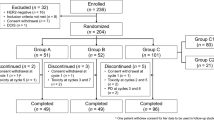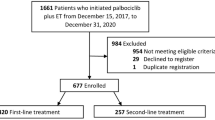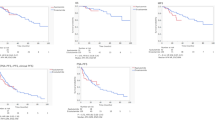Abstract
Purpose
To provide a snapshot of toxicities and oncologic outcomes of Abiraterone (AA) and Enzalutamide (EZ) in a chemo-naïve metastatic castration-resistant prostate cancer (mCPRC) population from a longitudinal real-life multicenter cohort.
Methods
We prospectively collected data on chemo-naïve mCRPC patients treated with AA or EZ. Primary outcomes were PSA response, oncologic outcomes and toxicity profile. The Kaplan–Meier method was used to compare differences in terms of progression-free survival (PFS) between AA vs EZ and high- vs low-volume disease cohorts. Univariable and multivariable Cox regression analyses were performed to identify predictors of PFS. Toxicity, PSA response rates and oncologic outcomes on second line were compared with those observed on first line.
Results
Out of 137 patients, 88 received AA, and 49 EZ. On first line, patients receiving EZ had significantly higher PSA response compared with AA (95.9% vs 67%, p < 0.001), comparable toxicity rate (10.2% vs 16.3%, p = 0.437) and PFS probabilities (p = 0.145). Baseline PSA and high-volume disease were predictors of lower PFS probabilities at univariable analysis (p = 0.027 and p = 0.007, respectively). Overall, 28 patients shifted to a second-line therapy (EZ or radiometabolic therapy). Toxicity and PSA response rates on second line were comparable to those observed on first line (11.1% vs 12.4%, p = 0.77; 73.1% vs 77.4%, p = 0.62, respectively); 2-year PFS, cancer-specific and overall survival probabilities were comparable to those displayed in first-line cohort (12.1% vs 16.2%, p = 0.07; 85.7% vs 86.4%, p = 0.98; 71% vs 80.3%, p = 0.66, respectively).
Conclusions
Toxicity profile, PSA response rate and oncological outcomes were comparable between first-line and second-line courses in patients treated with either AA or EZ for mCRPC. Our findings showed the tolerability and oncological effectiveness, when feasible, of two lines of therapy other than chemotherapy.


Similar content being viewed by others
Abbreviations
- CRPC:
-
Castration-resistant prostate cancer
- EZ:
-
Enzalutamide
- AA:
-
Abiraterone acetate
- PFS:
-
Progression-free survival
- OS:
-
Overall survival
- HSMPC:
-
Hormone-sensitive metastatic prostate cancer
- AR:
-
Androgen receptor
- mCRPC:
-
Metastatic castration-resistant prostate cancer
- CSS:
-
Cancer-specific survival
- ADT:
-
Androgen deprivation therapy
- AP:
-
Apalutamide
- nmCRPC:
-
Non-metastatic castration-resistant prostate cancer
- FDA:
-
Food and drug administration
- ARTA:
-
Androgen receptor-targeted agents
References
Beer TM, Armstrong AJ, Rathkopf DE, Loriot Y, Sternberg CN, Higano CS et al (2014) Enzalutamide in metastatic prostate cancer before chemotherapy. N Engl J Med 371:424–433
Ryan CJ, Smith MR, Fizazi K, Saad F, Mulders PF, Sternberg CN et al (2015) Abiraterone acetate plus prednisone versus placebo plus prednisone in chemotherapy-naive men with metastatic castration-resistant prostate cancer (COU-AA-302): final overall survival analysis of a randomised, doubleblind, placebo-controlled phase 3 study. Lancet Oncol 16:152–160
De Nunzio C, Presicce F, Giacinti S, Bassanelli M, Tubaro A (2018) Castration-resistance prostate cancer: what is in the pipeline? Minerva Urol Nefrol 70(1):22–41
National Comprehensive Cancer Network: NCCN Clinical Practice Guidelines in Oncology: Prostate Cancer (Version 4.2018). http://www.nccn.org/professionals/physician_gls/pdf/prostate.pdf. Accessed 29 Jan 2019
Cornford P, Bellmunt J, Bolla M, Briers E, De Santis M, Gross T et al (2017) EAU-ESTRO-SIOG guidelines on prostate cancer. Part II: treatment of relapsing, metastatic, and castration-resistant prostate cancer. Eur Urol 71(4):630–642
Azad AA, Eigl BJ, Murray RN, Kollmannsberger C, Chi KN (2015) Efficacy of enzalutamide following abiraterone acetate in chemotherapy-naïve metastatic castration-resistant prostate cancer patients. Eur Urol 67:23–29
Suzman DL, Luber B, Schweizer MT, Nadal R, Antonarakis ES (2014) Clinical activity of enzalutamide versus docetaxel in men with castration-resistant prostate cancer progressing after abiraterone. Prostate 74:1278–1285
Marchioni M, Sountoulides P, Bada M, Rapisarda S, De Nunzio C, Tamburro FR et al (2018) Abiraterone in chemotherapy-naive patients with metastatic castration-resistant prostate cancer: a systematic review of ‘real-life’ studies. Ther Adv Urol 10(10):305–315
Scher HI, Morris MJ, Stadler WM, Higano C, Basch E, Fizazi K et al (2016) Trial design and objectives for castration-resistant prostate cancer: updated recommendations from the prostate cancer clinical trials working group 3. J Clin Oncol 34(12):1402–1418
Common terminology criteria for adverse events (CTCAE) v4.02. https://evs.nci.nih.gov/ftp1/CTCAE/CTCAE_4.03/Archive/CTCAE_4.02_2009-09-15_QuickReference_8.5x11.pdf. Accessed 29 Jan 2019
Matsubara N, Yamada Y, Tabata KI, Satoh T, Kamiya N, Suzuki H et al (2018) Abiraterone followed by enzalutamide versus enzalutamide followed by abiraterone in chemotherapy-naive patients with metastatic castration-resistant prostate cancer. Clin Genitourin Cancer 16(2):142–148
Terada N, Maughan BL, Akamatsu S, Kobayashi T, Yamasaki T, Inoue T et al (2017) Exploring the optimal sequence of abiraterone and enzalutamide in patients with chemotherapy-naïve castration-resistant prostate cancer: the Kyoto-Baltimore collaboration. Int J Urol 24(6):441–448
Hara I, Yamashita S, Nishizawa S, Kikkawa K, Shimokawa T, Kohjimoto Y (2018) Enzalutamide Versus abiraterone as a first-line endocrine therapy for castration-resistant prostate cancer protocol for a multicenter randomized phase 3 trial. JMIR Res Protoc 7(7):e11191
Iacovelli R, Ciccarese C, Bria E, Romano M, Fantinel E, Bimbatti D et al (2018) The cardiovascular toxicity of abiraterone and enzalutamide in prostate cancer. Clin Genitourin Cancer 16(3):e645–e653
Moreira RB, De Biasi M, Francini E, Nuzzo PV, Velasco G, Maluf FC et al (2017) Differential side effects profile in patients with mCRPC treated with abiraterone or enzalutamide: a meta-analysis of randomized controlled trials. Oncotarget 8(48):84572–84578
Mottet N, Bellmunt J, Briers E, Bolla M, Bourke L, Cancer EEESGoP. EAU–ESTRO–ESUR–SIOG guidelines on prostate cancer. In: Office EG, editor. https://uroweb.org/guideline/prostate-cancer/2018. Accessed 30 Jan 2019
Hussain M, Fizazi K, Saad F, Rathenborg P, Shore N, Ferreira U et al (2018) Enzalutamide in men with nonmetastatic, castration-resistant prostate cancer. N Engl J Med 378:2465–2474
Smith MR, Saad F, Chowdhury S, Oudard S, Hadaschik BA, Graff JN et al (2018) Apalutamide treatment and metastasis-free survival in prostate cancer. N Engl J Med 378:1408–1418
Buelens S, De Bleser E, Dhondt B, Verla W, Decaestecker K, Ost P et al (2018) Importance of metastatic volume in prognostic models to predict survival in newly diagnosed metastatic prostate cancer. World J Urol 2018:1–7
Evans CP, Higano CS, Keane T, Andriole G, Saad F, Iversen P et al (2016) The PREVAIL study: primary outcomes by site and extent of baseline disease for enzalutamide-treated men with chemotherapy-naïve metastatic castration resistant prostate cancer. Eur Urol 70(4):675–683
Taplin ME, Armstrong AJ, Lin P, Krivoshik A, Phung Parli T et al (2017) Clinical outcomes of chemotherapy naïve men with metastatic castration resistant prostate cancer and low baseline prostate specific antigen treated with enzalutamide vs placebo. J Urol 198(6):1324–1332
Kyriakopoulos CE, Chen YH, Carducci MA, Liu G, Jarrard DF, Hahn NM et al (2018) Chemohormonal therapy in metastatic hormone-sensitive prostate cancer: long-term survival analysis of the randomized phase III E3805 CHAARTED trial. J Clin Oncol 36(11):1080–1087
James ND, Sydes MR, Clarke NW, Mason MD, Dearnaley DP, Spears MR et al (2016) Addition of docetaxel, zoledronic acid, or both to first-line long-term hormone therapy in prostate cancer (STAMPEDE): survival results from an adaptive, multiarm, multistage, platform randomised controlled trial. Lancet 387(10024):1163–1177
Oh WK, Cheng WY, Miao R, Vekeman F, Gauthier-Loiselle M, Duh MS et al (2018) Real-world outcomes in patients with metastatic castration resistant prostate cancer receiving second line chemotherapy versus an alternative androgen receptor targeted agent (ARTA) following early progression on a first-line ARTA in a US community oncology setting. Urol Oncol 36(11):500.e1–500.e9
Matsubara N, Yamada Y, Tabata KI, Satoh T, Kamiya N, Suzuki H et al (2017) Comparison of sequential treatment with androgen receptortargeted agent followed by another androgen receptor-targeted agent versus androgen receptor targeted agent followed by docetaxel in chemotherapy naïve patients with metastatic castration-resistant prostate cancer. Clin Genitourin Cancer 15(6):e1073–e1080
Author information
Authors and Affiliations
Contributions
MF: project development, data collection, data analysis, manuscript writing; RM: data collection, data analysis; CN: data collection; LC: data collection, data analysis, manuscript editing; FC: data collection; GT: data collection; CL: data collection; RSF: data collection; GT: data collection; UA: data collection; AB: data collection; SG: data collection; SG: data collection; JG: data collection; LS: data collection; AT: data collection; MG: project development, data analysis; GS: project development, data analysis, manuscript writing, manuscript editing
Corresponding author
Ethics declarations
Informed consent
All patients have signed the informed consent for data collection and follow-up.
Additional information
Publisher's Note
Springer Nature remains neutral with regard to jurisdictional claims in published maps and institutional affiliations.
Rights and permissions
About this article
Cite this article
Ferriero, M., Mastroianni, R., De Nunzio, C. et al. Managing lines of therapy in castration-resistant prostate cancer: real-life snapshot from a multicenter cohort. World J Urol 38, 1757–1764 (2020). https://doi.org/10.1007/s00345-019-02974-6
Received:
Accepted:
Published:
Issue Date:
DOI: https://doi.org/10.1007/s00345-019-02974-6




